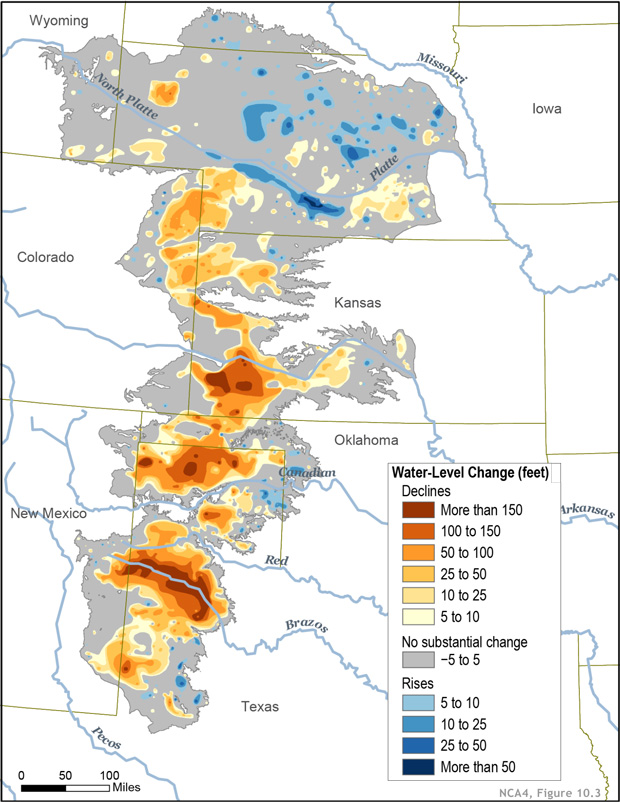
Sens. Michael Bennet (D-CO), Jerry Moran (R-KS), and Martin Heinrich (D-NM), introduced the Voluntary Groundwater Conservation Act, aimed specifically to protect the Great Plains’ Ogallala Aquifer.
The Ogallala Aquifer underlies parts of Colorado, Kansas, Nebraska, New Mexico, Oklahoma, South Dakota, Texas, and Wyoming. From wheat and cows to corn and cotton, the regional economy depends almost exclusively on agriculture irrigated by Ogallala groundwater. But according to the Fourth National Climate Assessment (NCA4), producers are extracting water faster than it is being replenished, which means that parts of the Ogallala Aquifer should be considered a nonrenewable resource.
The Voluntary Groundwater Conservation Act creates a new voluntary groundwater easement program at
the United States Department of Agriculture’s (USDA) Natural Resource Conservation Service (NRCS) within the
Agricultural Conservation Easements Program (ACEP). This easement program is modeled after the experience
of Colorado Open Lands, who signed the first-ever ground water easement in 2022 in the Rio Grande River
Basin. This easement locks in permanent reductions to the amount of groundwater that farmers pump while
compensating them at a fair market value for the water savings.
This flexible and enforceable tool will help protect groundwater sources while keeping agricultural lands in
production, rather than requiring a dry-up of irrigated lands or fallowing farm fields to meet aquifer recovery
goals. A groundwater conservation easement would be tailored to the needs of a specific water rights holder to
reduce their groundwater use at the level they choose for the entire operation. These groundwater easements
will provide an important tool for irrigators and water managers to meet challenges of water scarcity and help
sustain and recover aquifers to healthy levels without sacrificing the benefits to ecosystems and the rural
economy associated with farming.
Specifically, the Voluntary Groundwater Conservation Act would:
● Create a new Groundwater Conservation Easement Program at USDA to encourage voluntary,
compensated reductions in groundwater consumption on agricultural land and advance local, regional,
or state groundwater management goals;
● Allow NRCS to reimburse transaction costs up to 5 percent of the federal share and requires an advance
payment for limited resource producers to cover these costs;
● Guarantee long-term management flexibility for a producer to continue farming and choose how they
reduce their water use, as long as they conserve the amount they’ve committed to reducing each year;
● Ensure that farmers are fairly compensated using a payment based on the market value for the water
right instead of a per acre payment; and
● Clarify that easement funds shall not be counted towards a farm’s adjusted gross income and that
producers with an adjusted gross income of more than $900,000 are eligible for a waiver from the
Secretary to participate in groundwater conservation easements.
This legislation is supported by: Colorado Open Lands, Colorado Cattlemen’s Agricultural Land Trust, Colorado Farm Bureau, Rocky Mountain Farmers Union, Colorado Potato Administrative Committee, Ogallala Land & Water Conservancy of New Mexico, Southwest Kansas Groundwater Management District No. 3, Big Bend Groundwater Management District No. 5 of Kansas, Texas Agricultural Land Trust, National Wild Turkey Federation, National Audubon Society, the Theodore Roosevelt Conservation Partnership, and Western Landowners Alliance.














